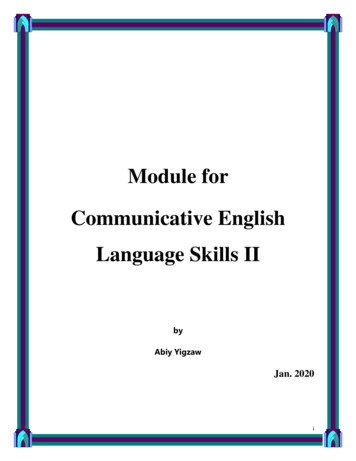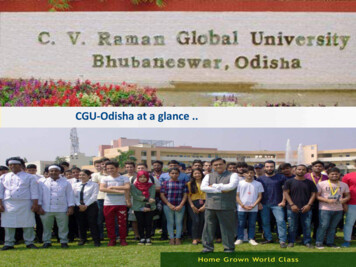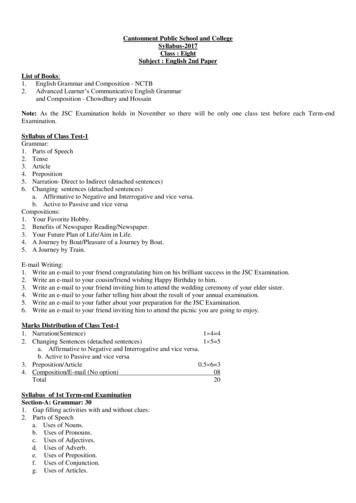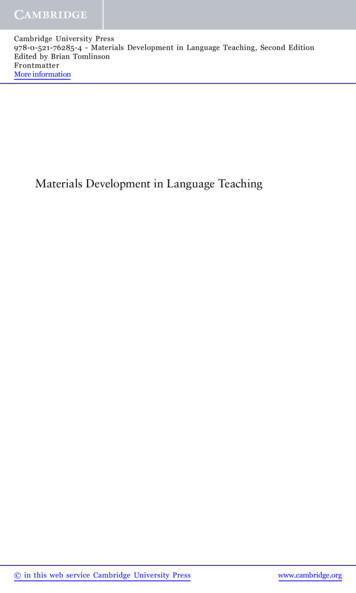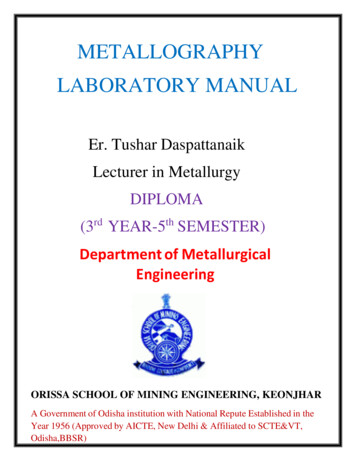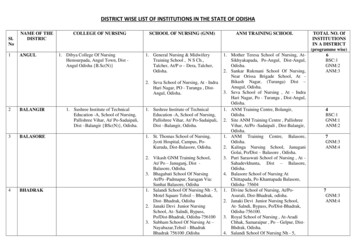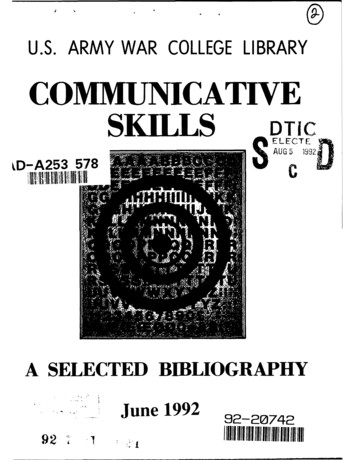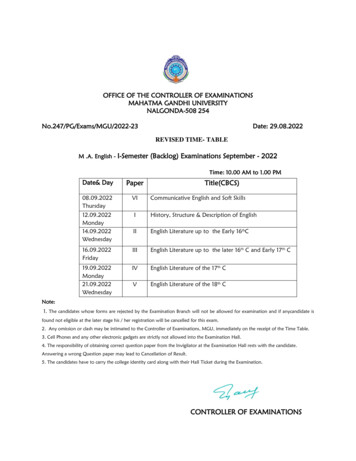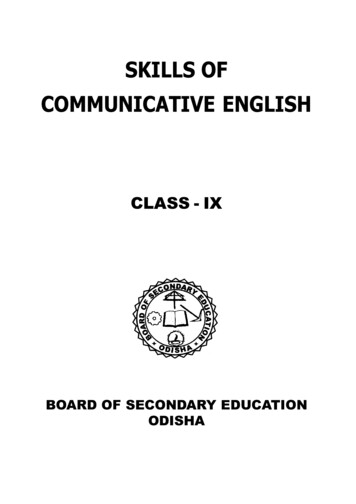
Transcription
SKILLS OFCOMMUNICATIVE ENGLISHCLASS - IXBOARD OF SECONDARY EDUCATIONODISHA
Published by the Board of Secondary Education, Odishafor Class-IXBOARD OR EDITORS :Detailed TextDr. Debendra Kumar Ray (Reviewer)Dr. Kalyani SamantarayDr. Kamadeba SahuSri Arun Kumar DashSri Baidyanath RoutSri Rabindra Kumar Panda (Co-ordinator)Non-Detailed TextDr. Amulya Kumar Purohit (Reviewer)Dr. Sandhyarani SahooDr. Susmita PaniSri Gadadhar BehuraSri Baidyanath Rout (Co-ordinator) BOARD OF SECONDARY EDUCATION, ODISHANew Edition : 2012 /Type Setting : COMPUPRINT, Link Road, CuttackPrinted at :Price : Rs.
PREFACEThe advent of globalization has set a new trend in the realm of curriculum renewalthroughout the world. Keeping this competitive environment in mind, India is pursuing afrontline educational policy to maintain its competitive edge in science and technology. Inaddition to this, English language teaching has acquired a renewed significance in variouscommunicative contexts, especially in the social sector and the job markets.Keeping these communicative contexts in mind, we have carefully pursued the majorrecommendations of the National Curriculum Framework of 2005 which reflect our approachto the specific needs of English language learners in the communicative contexts of thetwenty-first century.The present text Skills of Communicative English comprises two parts : the detailedtext in prose, poetry and functional grammar in the contexts of their subject-matter. In addition tothis, the specific aspects of listening, speaking, reading and writing skills have been dealt in theexercises meticulously designed for the purpose of practical communicative contexts. For instancethe model of project writing has been provided to cater to the present-day needs of our society.The second part of the text book contains the choicest selection of stories to provide forextensive reading to the learners at the secondary school level. The stories included in the text areinteresting, amusing and learner-centred. Their engaging narratives and nuances of characters aremeant to sharpen the literary sensibility of our students.Thus, the linguistic and communicative needs of learners have been richly reflected in wellchosen prose and story materials. The poems have been selected to promote understanding andenjoyment and to stimulate the learners’ interest in the uses of poetic language for literary flair,rhythm and thought content. In reality, attempts have been made to present a language-richenvironment in which teachers can help creation of a context in which the pupil can sustain theirinterest in English language and literature.It is significant that activity-based exercises, questions and vocabulary items included in thetexts are of a varied nature to promote thinking and understanding. It is hoped that, the detailedand non-detailed texts presented here will be simple and challenging while maintaing the quality ofmaterial at class IX level, in our present-day competitive environment.We are greatly indebted to all the teachers and learners of English who have graciouslygiven their feedback during in-house discussion of specific language items included here. We welcomecreative suggestions of practising teachers and their inputs on the basis of the guideline provided inthe exercises and other inputs provided in these texts.Editors
CONTENTSSl.No.ChapterPageDETAILED TEXT :1.The Priceless Gift012.The Swimmer Who Does Not Need Her Legs !153.Road Safety Week254.Missile Man of India415.A Hero576.Home and Love697.Nine Gold Medals738.The Noble Nature799.No Men are Foreign8310.Alexander Selkirk9111.Project97NON-DETAILED TEXT :1.The Trunk of Ganesh1012.The Lost Child1093.The First Step1214.The Magic Flute1315.The Portrait of a Lady139
FOREWORDThe Board has always played a leading role in redefining its part inimplementing the educational objectives in the light of the National CurriculumFramework. This guideline has spurred us to put stress on curriculum renewal inthe light of the changing needs of our state.It is significant that Secondary Education is the backbone of our educationalpyramid. Consequently, stress on the quality of education at this stage is thebackbone of a rising society. Keeping this in mind, the present textbooks in Englishseek to ensure learners’ acquisition of Communicative English Skills correctly andeffectively so that they can internalize the various patterns of second language withreasonable comment on listening, speaking, reading and writing.The present book Skills of Communicative English has been written in aninnovative way to suit to the needs of an age of technology on the threshold of globalintegration. In particular the topics in the detailed text for close reading and thestories for non-detailed study are eminently suited to the needs of the new generationof learners in our socio-cultural context.The Board would like to thank the authors and editors who have takenmeticulous care of the tasks of providing suitable exercises, vocabulary items inactivity mode. In reality our teachers will play a pivotal role in transacting the textintelligently and creatively. We hope, this book for class-IX will serve as a usefulmedium for strengthening the language acquisition skills of the learners.We invite creative suggestions of the academics in the light of which we willtake further steps for the improvement of the book.PresidentBoard of Secondary Education,Odisha
THE CONSTITUTION OF INDIAPREAMBLEWE, THE PEOPLE OF INDIA, having solemnly resolved to constitute India into a[SOVEREIGN SOCIALIST SECULAR DEMOCRATIC REPUBLIC] and to secure to allits citizens : JUSTICE, social, economic and political; LIBERTY of thought, expression, belief, faith and worship; EQUALITY of status and of opportunity;and to promote among them all FRATERNITY assuring the dignity of the individual and the unity and integrity of theNation.IN OUR CONSTITUENT ASSEMBLY this twenty-sixth day of November, 1949,do HEREBY ADOPT, ENACT AND GIVE TO OURSELVES THIS CONSTITUTION.1.Subs. by the Constitution (Forty second Amendment) Act, 1976, Sec.2, for“Sovereign Democratic Republic” (w.e.f.3.1.1977)2.Subs. by the constitution (Forty second Amendment) Act, 1976, Sec.2, for “Unityof the Nation” (w.e.f., 3.1.1977)PART IV AFundamental DutiesARTICLE 51AFundamental Duties - It shall be the duty of every citizen of India–(a) to abide by the Constitution and respect its ideals and institutions, the National Flagand the National Anthem;(b) to cherish and follow the noble ideals which inspired our national struggle for freedom;(c) to uphold and protect the sovereignty, unity and integrity of India;(d) to defend the country and render national service when called upon to do so;(e) to promote harmony and the spirit of common brotherhood amongst all the peopleof India transcending religious, linguistic and regional or sectional diversities; torenounce practices derogatory to the dignity of women;(f) to value and preserve the rich heritage of our composite culture;(g) to protect and improve the natural environment including forests, lakes, rivers, wildlife and to have compassion for living creatures;(h) to develop the scientific temper, humanism and the spirit of inquiry and reform;(i)to safeguard public property and to abjure violence;(j) to strive towards excellence in all spheres of individual and collective activity so thatthe nation constantly rises to higher levels of endeavour and achievement.(k) who is a parent or guardian to provide opportunities for education to his child or asthe case may be, ward between the age of six and fourteen years.
DETAILED TEXTThe Priceless GiftA. Lead inDo you like to offer some gift to somebody on his / her birthday,wedding or some special occasion ? What sort of things would you like togive ? Discuss about it with your classmates. Why does a small gift becomeso valuable ?What do you see when you enter a restaurant ? Read this interesting story,‘The Priceless Gift’. Here ‘priceless’ means something which has a high value,because it is rare. Match your points of discussion with this description.B.The Text :II went to a vegetarian restaurant. It was lunch time. There were peopleeating and drinking. The restaurant was very crowded. I saw that some of thechairs and tables had been pushed into a corner. I chose the corner table,seated myself and started skimming through the newspaper.At that moment I noticed a very young girl looking at me. Her eyes werelarge and they had a sad expression.As she was going out she asked the cashier in a low voice, ‘Is thatgentleman an Indian ?’‘I think so’, the cashier replied. The girl looked at me once more, andwent out.It suprised me. Why ? What was the matter ? Her interest in me arousedmy curiosity in her. When I had finished my lunch I asked the waiter, ‘Do youknow the girl who was sitting out there ?’
[2]‘No, Sir, I notice she has lunch here on Saturdays. She comes on payday only. Perhaps she does not earn much.’I was moved by what he said. The curiosity I felt about the girl persisted.Why had she enquired about me ? Who was the mysterious child ? I keptthinking of her poverty-stricken sad anxious figure. Could I help her in anyway ?The week passed. Saturday came again. I went to the same restaurant.As I entered I saw her sitting at the same table as before. She was eating. Iwent up to her and took the chair opposite hers.I wished her a good afternoon and then by making one brief remark afteranother, I was able to start a conversation. At last she asked, ‘Are you anIndian ? My brother is in India. He is a soldier. We have not had a letter fromhim for a long time. My mother is very worried. She is afraid something hashappened to him.’I learned that her only guardian was her brother. She lived with her old,widowed mother Mrs. Bethy.I understood how she felt. I think she wanted me to see her mother butshe did not have the courage to ask me to accompany her home.We finished our lunch and got up together. As we walked I asked her,‘May I know your name ?’‘My name is Maggie.’We chatted pleasantly and soon reached a bus stand. This gave me theopportunity of asking her where she worked.‘Do you usually go this way ?’ I asked.‘No’, she answered. ‘I usually take the village bridge. It is being repairedat the moment.’Soon we approached their neighbourhood. We had reached a narrowdoorway. Maggie took a thin latch key out of her pocket and opened the door.She entered and said, ‘Please come in’.
[3]Together we descended the stairs to the kitchen.‘Mother’, said Maggie from the doorway, ‘an Indian gentleman has cometo see you’.‘Where is he ?’ the old woman asked eagerly. With a smile I steppedinto the kitchen behind Maggie.She introduced us. ‘How do you do ?’ I said and held out my hand.‘Excuse me. My hands are covered with flour. I am making cakes. Peoplewill come to buy them this evening. This is the way we make our living – lotsof trouble.’Saturday night is a time of festivity in poor neighbourhoods. All kindsof things are sold on this night. The streets are more crowded than any otherday. This is the day when they are able to spend a little from their weeklywages.II‘What kind of country is India, sir ?’ asked Mrs. Bethy as she resumedher cooking.‘A beautiful country’.‘Safe to live in ? Aren't there too many snakes and tigers ? Don't theykill people ?’‘This type of question has often been asked. Don't believe that snakesand tigers are killed by the people if they come too close.’‘My son is in the Punjab. He is a soldier. What kind of place is thePunjab ?’‘The Punjab is a fine place. It is a very healthy place to live in’.‘I'm glad to hear it’. Mrs. Bethy said.Her baking was finished. ‘Maggie’, she said, ‘take Mr. Gupta upstairs.I'll wash my hands and bring tea’.As we drank tea I talked about India. Mrs. Bethy showed me aphotograph of her son. It had been kept very neatly in an envelope by themother. His name was Franky.
[4]‘Maggie’, said Mrs. Bethy, ‘show Mr. Gupta the ring which your brothersent you.’She brought it and asked, ‘Can you see the past and future in it ?’ I tookit and examined it.‘When Franky sent the ring’, Mrs. Bethy said, ‘he wrote that if youconcentrate on a distant person as you gaze into it, you will be able to seehim and what he is doing. We have not had any news from Franky for a longtime. But we have not been able to see anything. Why don't you try ? You arean Indian, you may be able to do it ?’I did not have the heart to tell the mother and daughter that the ring wasnothing much– not a miraculous thing from a distant land. How could I shattertheir dream ?IIISeveral months passed. I visited Maggie and Mrs. Bethy. But no newshad come from Franky. Mrs. Bethy was sick, in a serious condition, aggravatedby her anxiety for Franky. I was in a fix. What could I say to console themother ? Only God knew whether Franky was still alive or dead.‘Mr. Gupta’, the girl said, ‘My mother has not been ill like this before.I have read in books that Indians love the truth. If you could bring yourself totell mother only once, after looking into the crystal, that Franky is all right, thathe is alive – will it be too much of a lie ? Will it be very wrong ?I thought it over, I am not a very virtuous man so I decided to do this,the least of my offences.Maggie brought me the ring. I took it and approached her mother'sbedside. Wishing her a good morning I said, ‘Mrs. Bethy, your son is alive.He is well’.The old woman raised her head a little off the pillow. Tears of happinesswelled up in her eyes. Mrs. Bethy soon recovered.
[5]It was almost time for me to return to India. I wished to go, to saygoodbye to Maggie and her mother. But the family was in mourning. Frankyhad been killed in the fighting on the frontier. I calculated and found thatFranky had been dead some days when I told his mother he was alive and well.I felt ashamed to face Mrs. Bethy so I wrote a letter to them, announcing mydeparture and bidding them goodbye.The morning of my last day in London dawned. I was to leave that night.As I was having my breakfast, there was a knock at the door.Maggie had come to say goodbye. She was wearing black.‘Are you leaving today ?’ she asked. ‘Yes’, I replied, ‘today is the dayof my departure.’‘How long will it take to reach your country ? In which part of thecountry do you live ?’ She wanted to know.‘I have entered the Punjab service. I shall not know exactly where I amposted until I arrive there’.‘Is the frontier very far from there ?’‘No, not very’.‘Franky is buried near the frontier.’ The girl's eyes filled with tears asshe spoke.‘When I go to that part of the country I shall visit your brother's graveand write to you’.IVMaggie's face filled with gratitude. As she thanked me her voice choked.She took a shilling out of her packet, saying, ‘Please buy flowers with this whenyou go, and lay them on my brother's grave for me.’
[6]In my emotion I lowered my eyes. The child had earned the shilling withso much toil. I felt like returning it to her, explaining that in our country flowersgrow in great profusion.But I considered, ‘Why should I deprive her of the joy this sacrificewould give her ?’ She was foregoing so much for love of her brother. The joyof doing it was beyond all price. The grief in her heart would be eased a little.I picked up the shilling.‘Maggie’, I said, ‘I shall use this shilling to buy flowers and put themon your brother's grave.’Maggie stood up. ‘How can I ever thank you’, she said. ‘Goodbye.Remember to write’.I got up and held her hand. ‘Goodbye, Maggie, God bless you,’ I said.Maggie left. I wiped a tear from my eyes and went upstairs to pack my bags.C.Notes and Glossary :aroused- awakened, stirred - This story has aroused my interest.persisted- continued to exist. The pain persisted into the morning.mysterious-poverty-stricken opportunitystrange.suffering extremely because of lack of money.- situation that makes it possible for you to do something thatyou want to doa thin latch key - a thin key for a latch (lock)festivity- celebration.concentrate- to give all attention.miraculous- amazing, unbelievable, surprising and fortunate.aggravated- worsenedin a fix- in a dilemmacrystal- a mineral or a rock (clear and transparent)
[7]offences- crime, wrong-doingwelled up- appeared.mourning- lamenting or grieving forannouncing- declaring, revealing, reporting.grave- a grave is a place where a dead person is buried.gratitude- the feeling of being gratefulI must express my gratitude to the chief guest for acceptingour invitation.shilling- a unit of money (20 shillings make an English pound)profusion- abundance, plenty.foregoing- sacrificing.D.Let's understand the text :1.What did the writer experience in the restaurant ?2.What did he notice there ?3.What was the writer's first impression of the girl ?4.What made the writer surprised ?5.Why did he enquire from the cashier ?6.What information did he get from the cashier ?7.Where did the writer go on the next Saturday ?8.Why did he arrange the chair opposite hers ?9.What query did the girl make about the writer ?10.What impression did the writer have about the family of the girl ?11.How was the writer treated at Maggie's house ? Who was there to welcomehim ?12.What was Mrs. Bethy doing when the writer met her ?Why was she unwilling to go for a handshake ?
[8]13.Why did the girl usually visit the restaurant on Saturdays ?14.What did Mrs. Betty believe about the ring ?15.What made the author to tell a lie about the ring ?16.Did the telling of a lie benefit Mrs. Bethy ?17.Why did the writer feel guilty about himself ?18.What was Maggie's gift to the writer ?19.Why was it a priceless gift ?20.Did Maggie love her brother dearly ? Give reasons.E.Let's understand the text better :1.Why did the writer choose the corner table in the restaurant ?2.How did the writer start a conversation with the young girl ?3.How could the writer guess the girl to be poverty-stricken ?4.Which of the following do you think the author will talk about aftermeeting the girl ?5.(a) Meeting the girl again(b) Enquiring about her nature of work(c) about her family(d) all the above.‘I was moved by what he said’. What impression did the writer get aboutthe girl ?6.What impression did the girl have on India ?7.‘Will it be too much of a lie’ ? Why did the girl say so ?8.Why did the writer feel ashamed to face Mrs. Bethy at the time of hisreturn to India ?9.Why was the shilling Maggie presented to the writer was an invaluableoffering ?
[9]F.Let's learn some words :(A)Words which are not derived or developed from other words are calledprimary words. They belong to the original stock of words in thelanguage. Compound words are formed noun to noun (moonlight, villagebridge) adjective noun (sweetheart), verb noun (breakfast) gerund noun (drawing room), preposition noun (overcoat) noun adjective (lifelong).By adding prefixes like mis, un, in, dis, it, anti, de, make the wordnegative and by adding suffixes we change the words from noun toadjective, adjective to verb, adjective to adverb and verb to noun. Thisis called derivation. Thus we find a family of words.Here is an exercise for you. Fill in the gaps using the appropriate formin each sentence : one has been done for you.Example : 1. There is anof anger on his face. (express)There is an expression of anger on his face.2. He made hisfrom the scene after a dialogue. (depart)3. She performed well at her first4. She showed a5. I had a. (opportune)for my past life. (curious)with my friend. (converse)6. You need a lot ofperfectly. (concentrate)on the subject to understand it(B)Look at the following dialogues carefully and write them in thecorrect sequence as they occur in the story.1.‘How can I ever thank you ?’ she said.2.‘Are you leaving today ? she asked.3.‘When I go to that part of the country / I shall visit your brother's graveand write to you.’4.‘Excuse me, my hands are covered with flour ?’
[ 10 ]5.‘My son is in the Punjab. He is a soldier’.6.‘May I know your name ?’7.‘Are you an Indian ? My brother is in India’.8.‘What kind of country is India, Sir ?’9.‘Show Mr. Gupta the ring which your brother sent you’.10.‘Mrs. Bethy, your son is alive. He is well’.(C)Study the following combination (collocation) of words. One isadjective and the other is noun. Examples.Happy man(Adj. Noun)Previous day(Adj. Noun)Wonderful place(Adj. Noun)Power house(Noun Noun) the first noun becomes adjectiveGood manners(Adj. Noun)Japanese girl(Adj Noun)There are a group of adjectives (descriptive words) chosen from the text.They are – miraculous, mysterious, brief, only, weekly, virtuous, serious,healthy, sad.Fill in the gaps choosing the appropriate adjectives. One has been donefor you.(i)I hope that some miraculous change will occur.(ii)The children have(iii)There was some(iv)She suffered from a(v)He leads a(vi)He started with a(vii) He attends every(viii) Ramesh is theappetite.news for the child.illness.life all the time.description of the subject.meeting.child of his father.
[ 11 ](D)Compound adjectives are beautifully formed with the adding of nounwith participle. One of such compound adjectives is used in the text.i.e., poverty strickenIn column ‘A’ there are the nouns and in column ‘B’ there are participleskept in disordered manner. You are to match them and make compoundadjectives (The first noun becomes the kenhandeatenWords in the circles are not written in order. Put them in order and makesentences.wearingshe thewas motheaten clotholdreceiveshe was newstoheartbrokentheischild thecompletely andillbed riddentablethe on toythe ishandmadeGovernmentthehelpedby peasantspoverty strickenwere the
[ 12 ]G.Let's learn use of language :Active and Passive Voice.Much objective writing is done in the passive voice. For the passive voicewe may use any one of the tenses. With each one we have to use therelevant tense of ‘be’ along with the past participle of the main verb.TenseFormExamples in the passive(from the text)Simple Presentis/am/are past participleMy hands are covered withfoam.Present Progressive is/am/are being PPIt is being repaired at themoment.Present Perfecthas/have been PPIt has been kept very neatlyin that envelope.Simple pastwas/were PPMaggie's face was filledwith gratitude.Past Progressivewas/were being PPA letter was being written toher.Past Perfecthad been PPSome of the chairs andtables had been pushed intocorners.Future timeshall/will be PPAll kinds of things will besold in the night.Referring towould be PPThe grief in her heart wouldPresent perfectProgressivePast PerfectProgressiveFuture in pastbe eased a little.Note : The present perfect progressive and past perfect progressive in thepassive voice are very rarely used.
[ 13 ]1.Supply the correct form of the verb to fill in the gaps in the followingnarration.When the match was coming to an end I(tell) by my fatherto leave the stadium quickly to attend to my cousin at the hospital where he(bring) by an ambulance. Irickshaw(shock) to hear this. An auto(arrange) and I reached the hospital and then to the wardin no time. I saw that my cousin(bandage) and was lying on thebed with a saline hanging on a stand beside the bed. The nurse told me he(inject) with antibiotics.H.Let's write :There are a few dialogues between the teacher and Deepak. Some dialoguesare omitted. Fill in the dialogues according to the sequence. A few hints aregiven in the bracket.Teacher:Deepak. Please come here if you have finished writing.Deepak:Sir, it is over.Teacher:Deepak:Teacher:Deepak:Yes Sir, we were taught this subject twice. But I wa confused.Teacher:(Checking the note) Deepak,(demand the copy)Here is my copy. Sir, the question was difficult.? (enquiring)?Deepak:Sir, this sentence was actually told by you.Teacher:It is just andDeepak:Sir, I remember your words.Rome was not built in a day.
[ 14 ]Teacher:Deepak:Teacher:Deepak:Teacher:Deepak:? (Asks to know his response)Sir, I was greatly moved by it.?Sir, I found this sentence in a book.?I bought the book in the exhibition.There was a great rush in the exhibition.Teacher:?Deepak:I also bought one story book.Teacher:It is better to have companionship of books.After you have completed writing the dialogues, have a role play with yourpeers inside the classroom.
[ 15 ]The Swimmer Who Does Not Need Her Legs !A.Lead in :We meet several people on our way to school or on our return fromplaces of work. Vendors, hawkers and handicapped people – do we anytimethink about them ?Think about a child who is struck by polio and discuss the followingpoints in pairs.(i)Does he / she swim across a pond or a river ?(ii)Will it be easy or difficult for him / her ?(iii) Will it be impossible for him / her ?Read the lesson and see how a young girl of nineteen who was struckby polio was able to swim the English Channel. Her crippled legs did not standin her way to become a talented sea-swimmer.B.The Text :1.Imagine swimming across a pool with your feet dragging you down. Nowimagine having the courage to swim across the English Channel in a similarfashion. Unbelievable, isn't it ? In spite of having legs made useless bypolio, C.N. Janaki has become the first handicapped person to be partof a successful team - crossing the Channel.2.It was in 1987 that Janaki was struck by polio. As a child she got theidea of trying to swim the English Channel. So she conveyed this to theEnglish Channel Swimming Association for details and they replied thattwo conditions have to be met before a swimmer is allowed to make anattempt :Ia. The swimmer should be able to spend at least ten hours continuouslyin water.
[ 16 ]b. The swimmer should be able to do marathon swimming, that is, heor she should be able to swim in the high seas for long hours at astretch.3.Janaki began training very hard in Bangalore to fulfil these conditions.‘After almost four years of training’, she said, ‘I was able to spend tenhours at a stretch in the swimming pool. An NIS coach, Mr. Gopal, gaveme a certificate saying that he had seen me swim for ten hourscontinuously.’4.Then, with the help of the Thimaiah National Academy of Adventure,she went to the coastal town of Malpe and began training in the ArabianSea. She spent three weeks there with a coach called Dinesh Suvarna.She learnt to spend long hours in the sea by swimming a minimum of20 kilometres a day.5.Janaki then returned to Bangalore and sent her certificates to the ChannelSwimming Association in England. When they gave her the permissionto make the attempt, she had to start collecting funds for the trip. Thegovernment, a few private agencies and several friends contributed themoney she needed for the attempt.6.Janaki and her parents left for England in the middle of 1992. When shereached Dover and began practising in the English Channel, the ChannelSwimming Association officials were quite shocked. This was the firsttime in their experience that a physically handicapped person was tryingto swim the English Channel.II7.‘They were very worried, said Janaki, ‘and they kept a sharp eye on meduring my training runs. I trained for about three weeks under the famousChannel coach, Stella Streeter. But when I told them that I wanted tomake a solo attempt, they said they did not have a special boat to
[ 17 ]accompany me. This was in case I needed to be lifted out of the water;so it was decided that I would be part of a relay team.’8.The Channel swim can be done in two ways. One is the solo, and theother the relay swim. Six swimmers form a team and they each do aminimum of two hours of swimming. Now the other swimmers in theteam, mostly Americans, were amazed to see that Janaki could swim, andto honour her they named the relay team, ‘Janaki’s Maritime Express’.Needless to say, every member of the team other than Janaki wasphysically normal.9.The unique attempt was made on 28 July 1992. ‘My fight,’ said Janaki,‘in the course of the swim was against nature. The Channel waters areso cold that I needed much more energy than usual to keep my armsmoving. Then I had the problem of my legs moving to the left or to theright, whichever way the waves were moving. So I really needed a lot ofenergy. The water was very salty, and when it entered my mouth, I feltsick. And then there were the seaweeds and jelly fish. These fish keptsticking to my body and I felt very uncomfortable.’10.However, despite these problems, Janaki successfully did her share of therelay. She swam for about two hours and helped the relay team crossthe 36 km Channel in 14 hours and 45 minutes.11.Janaki's parents, Mr Nagappa and Mrs Indiramma, had anxiously stoodon Dover beach wondering how things would turn out. ‘We could noteat a single morsel,’ said Mr Nagappa. ‘How could we when ourdaughter was doing something so dangerous ? For us old paople it wasreally very agonizing’. But their daughter did triumph and become the firsthandicapped swimmer to part-swim the English Channel.12.After her success Janaki said, ‘Although I wanted to swim solo, I'mnevertheless happy that I was part of a relay team that helped me fulfilmy dream of swimming the English Channel. I would now like to starttraining for the 1996 Paraplegic Olympics in Atlanta.
[ 18 ]13.Janaki, who is a bank officer in Bangalore, has a simple philosophy : ‘Ihave always wanted to do something worthwhile in life. I strongly believethat the word ‘impossible’ is applied to something that has not been tried.I wanted to prove that to be handicapped is no bar to success. One canovercome all obstacles by hard work, determination, courage and selfreliance. Self-reliance is very important. God helps those who helpthemselves. Lastly, there is one more thing I would like to say : there isreally no short-cut to success !’.C.Notes and Glossary :English channel: the narrow sea passage that separates England andFrance.polio: infectious disease of t
The present book Skills of Communicative English has been written in an innovative way to suit to the needs of an age of technology on the threshold of global integration. In particular the topics in the detailed text for close reading and the stories for non-detailed study are eminently suited to the needs of the new generation .
